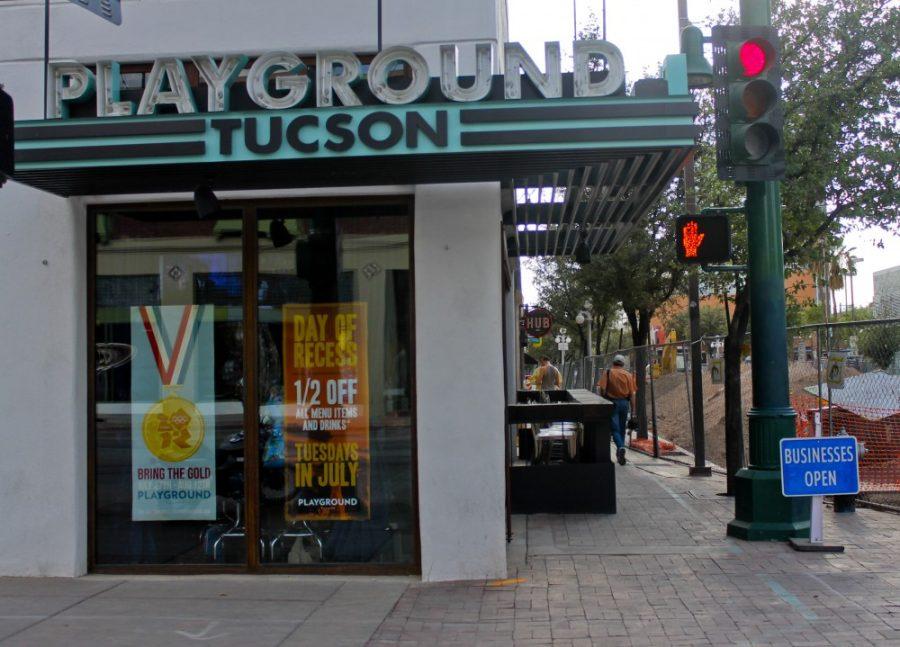As streetcar construction continues throughout the downtown area, restaurants and bars are seeing a decline in business. While some business owners are worried about having to close their locations, others continue to maintain a positive outlook and plan for the increased traffic the streetcar is expected to bring to the area.
Noël Chester, owner of The District Tavern on Congress Street between Fifth Avenue and Arizona Avenue said she’s “struggling to survive” through streetcar construction. Chester, who has been a downtown business owner for just over a decade, said the closing of Sharks nightclub is “horrendous” and streetcar construction has made downtown a “ghost town.”
“To lose that nightclub and that demographic of customers is really frightening,” Chester said.
Chester also said its Vaudeville Cabaret was supposed to close the doors due to construction, though she doesn’t have any details, as the cabaret’s business phone is temporarily disconnected. Kevin Ketchum, who was once partners with Chester, has owned the cabaret on his own for eight years now.
“I know that he Facebooked a statement and I know that he was planning on closing the month of July,” Chester said.
Regional Transportation Authority, a government entity approved by Pima County voters in 2006, has funded the MainStreet program to provide consulting to businesses along the streetcar corridor. Britton Dornquast, the program’s manager, said he understands the challenges business owners have to overcome during any construction.
“Noël is right in that construction’s not fun,” Dornquast said. “There is nothing that I could share that is an incredible redeeming factor whilst in the middle of construction.”
Dornquast opened Hear’s Music, an independent music store on Campbell Avenue, in 1991 after winning a business plan competition. During the 16 years the music store was in business, before losing his lease in 2007, Dornquast said he went through construction on Campbell Avenue and learned how it can affect a business.
“Some of the best things you can learn in business is through your failures,” he added.
The MainStreet program focuses on four key areas: outreach, construction meetings, direct consulting and resources. Business owners can use any or all of the program’s components at any time before, during or at the end of construction. The program offers confidential consultants to speak with owners, while its resource component includes a list of 2,500 online resources such as modules, workshops and personalized maps for businesses.
“We have yet to lose anybody (businesses) because of construction,” Dornquast said.
Chester said the consultants who have come in and talked to her are nice, but they can’t solve her problem.
“Consultants to tell you what?” she said. “Spend more money on advertising when you’re making less? Put your money away after you just started making money since the last construction period?”
Dornquast said it is impossible to compensate businesses for their loss, as there are too many factors that go into running a successful business. While construction does deter clientele, the economy, competition, advertising, planning and evolution in the industry are all factors that can make or break a business.
The District Tavern’s business is down almost 40 percent, according to Chester, who said she has been surrounded by fences since construction started.
Kade Mislinski, owner of Hub Restaurant and Creamery and Playground Bar and Lounge, has also noticed a change in downtown Tucson.
“The construction was a part of that evolution,” Mislinski said. “In our business model we planned for hard to get to and maybe less sales and that kind of stuff.”
Mislinski opened Hub in February 2011 and Playground a year later. Because his businesses are still young, Mislinski said he can’t accurately calculate his business loss. He said he has noticed a 20 to 30 percent business loss since he opened the restaurant, but remains optimistic for the streetcar’s opening.
“My experience has been pretty good,” Mislinski said. “I’m actually pretty impressed with the schedule they’re keeping.”
Mislinski said he tries to keep a “positive spin” on his business and communicates with RTA consultants on a regular basis, and that there are over $100 million being invested in the four blocks around Hub and Playground. The investment and the upcoming residences make him excited about the outcome of the project, he said, adding that plans to open a milkshake restaurant and small bar are in the works.
Mislinski, who hasn’t used any MainStreet Program resources, according to Dornquast, said he was taught to believe that the main reason a restaurant fails is because of bad management.
“I always look internal,” he said. “It doesn’t matter if a meteorite just went off in your alley … it’s your responsibility.”
Chester said, however, that she believes the streetcar is a waste of time and money and that construction is keeping people from coming west of Campbell Avenue and south of Speedway Boulevard.
“It just feels like they don’t want us here,” Chester said. “That seems to be the pink elephant in the room.”









